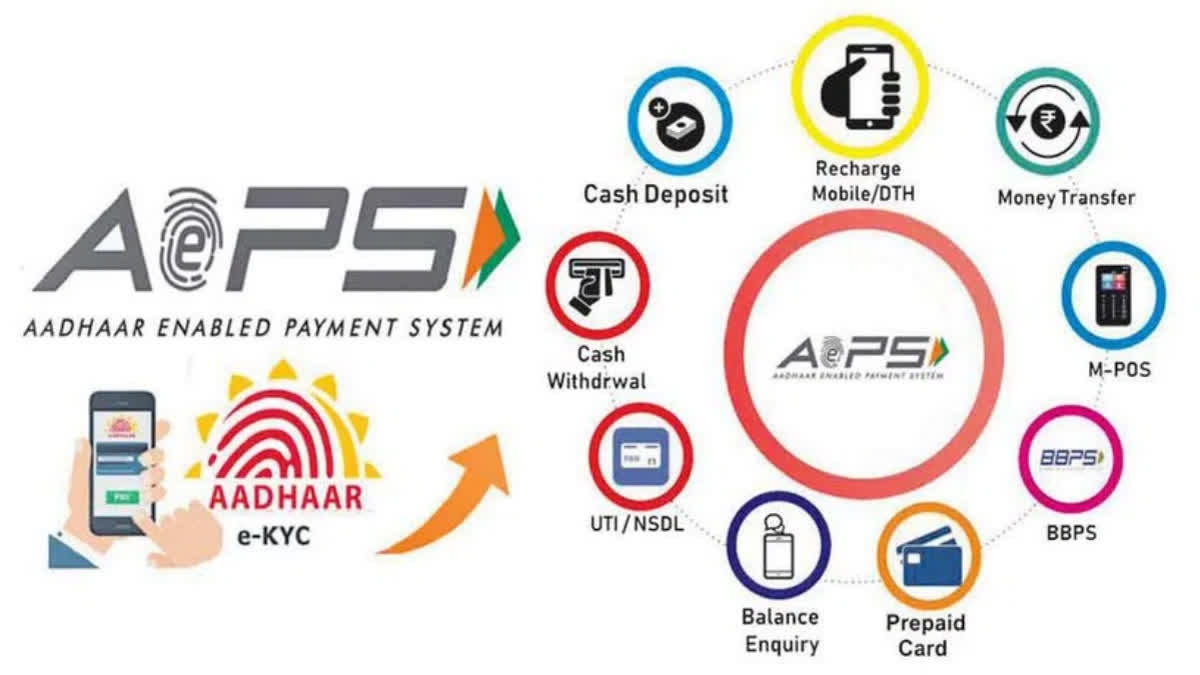New Delhi: Aadhaar-enabled payment systems (AePS) have been widely used in the country as financial inclusion and digital payments reach hinterland parts of the country. These Aadhaar-based payments using the biometric credentials of bank customers are now being used by banking correspondents for the transfer of funds, for deposit and withdrawal of cash and also for payments of goods and services, but the latest official data showed that despite the use of biometric authentication, cases of frauds occur and customers lose their money.
In response to a question in the Lok Sabha, Dr Bhagwat Karad, the Minister of State for Finance, informed the House that 485.94 crore transactions have been done through AePS and 34.10 crore customers have been served in the last financial year that ended in March 2023.
What is an Aadhaar-based payment system?
Aadhaar Enabled Payment System (AePS), as it is known in the fintech industry, is a bank-led model, which allows online interoperable financial transactions in bank accounts. It also includes the transactions in the accounts of beneficiaries of the Direct Benefit Transfer (DBT) scheme through Business Correspondents (BCs), using Aadhaar-based biometric authentication.
These banking correspondents or business correspondents provide last-mile delivery of basic banking services like cash deposit, cash withdrawal, intra-bank or interbank fund transfer, balance enquiry and mini statement, among other services to the bank customers.
Cases of fraud in Aadhaar-based payment systems
However, everything is not smooth just because of the use of Aadhaar-based biometric authentication at the point of transaction. The official data revealed that during the last five years from 2019 to 2023, the total value of approved transactions under the Aadhaar-based payment system was nearly 8.68 lakh crores, a huge amount by any yardstick.
However, despite biometric authentication, bank customers have lost over Rs 5.85 crore due to the frauds committed with them at the time of these transactions. The data showed that India’s largest bank, the State Bank of India, which reported maximum Aadhaar-based transactions during these five years, was also most vulnerable to such frauds.
Also read: No breach in Aadhaar card holders' data, Union Minister tells Rajya Sabha
Except in the current year (2023), the SBI customers suffered maximum loss during 2019 to 2022 due to fraudulent transactions using Aadhaar-based payment systems. In 2023, Canara Bank reported AePS-based transactions worth Rs 4,369 crore and its customers suffered a cumulative loss of Rs 14.29 lakh while SBI reported transactions worth Rs 41,861 crore, but its customers suffered a cumulative loss of Rs 10 lakh only during the year.
In the same year, Union Bank of India reported Aadhaar-based transactions worth Rs 10,383 crore and its customers lost Rs 9.91 lakh while Punjab National Bank reported AePS-based transactions worth Rs 15,624 crore and its customers lost Rs 8.79 lakh during the year.
Over the last five years, the State Bank of India has been the worst sufferer of frauds in Aadhaar-based payment systems as the largest bank with the widest reach it was more vulnerable to such frauds due to the sheer number of transactions. For example, in 2022, SBI reported AePS-based transactions worth nearly Rs 99,000 crore and its customers lost Rs 30.88 lakhs due to frauds in the Aadhaar-based payment system.
In the same year, Canara Bank reported AePS-based transactions worth Rs 13,137 crore, but losses due to frauds in the system were disproportionately higher at Rs 17.14 lakhs, showing the data shared by the government in Parliament. In the same year, Union Bank of India reported AePS-based transactions worth Rs 24,341 crore and its customers lost Rs 7.81 lakhs due to frauds in the Aadhaar-based payment system.
The official data showed that top private banks such as HDFC Bank and ICICI Bank are also not immune to frauds committed in the Aadhaar-based payment system. For example, HDFC Bank, which has become India’s largest private sector bank after its merger with housing finance company HDFC this year, reported Aadhar-based transactions worth Rs 1741 crore during 2022 and its customers suffered a loss of Rs 7.37 lakh year during the year showed the data shared by the government in the Lok Sabha.
Similarly, ICICI Bank reported AePS-based transactions worth Rs 1,967 crore in 2022 and its customers suffered a cumulative loss of Rs 6.61 lakhs due to frauds committed in the Aadhaar-based payment system.
Tackling frauds in Aadhaar-based payments
The minister said as the fingerprint is the prominent modality of biometric authentication, there is a constant endeavour by the Unique Identification Authority of India (UIDAI) to make the ecosystem increasingly safe and secure. “To prevent AePS frauds by use of any possible spoofing attempts, UIDAI has developed an in-house Artificial Intelligence-Machine Learning based solution which is able to detect the liveness of the fingerprint captured at the scanner of the device and therefore the gummy finger or spoofing attempts are detected,” Karad told Lok Sabha members.
Moreover, in order to make AePS transactions safe and secure, the National Payment Corporation of India (NPCI) has developed a Fraud Risk Management (FRM) system, which is a real-time fraud monitoring solution and it has been given to banks free of cost as a value-added service. FRM facilitates the setting of rules and limits for the entire ecosystem, said the government.



